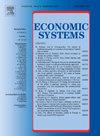Revealing the secrets of working capital: A comparison between sharia-compliant and conventional firms
IF 3.3
2区 经济学
Q1 ECONOMICS
引用次数: 0
Abstract
This research compares the performance of sharia-compliant (SC) and non–shariah-compliant (non-SC) firms by examining the impact of working capital on the return on assets, the return on equity, and the net profit margin. The dataset, based on the Dow Jones Islamic Market Index (DJIMI) standards, is divided by the leverage ratio and includes PSX-500 firms listed in the Pakistan Stock Exchange from 1996 to 2020. Our findings reveal that working capital has a significant and positive effect on all firm proxies, among which non-SC firms outperform SC firms because of their access to funds for business operations. SC firms face restrictions in obtaining funds from conventional banks. Our study has many implications. As liquidity injection is crucial for growth, policy makers should focus on developing novel credit instruments that are SC to address financing needs and boost business operations.
揭露营运资金的秘密:符合伊斯兰教法的公司与传统公司的比较
本研究通过考察营运资本对资产回报率、股本回报率和净利润率的影响,比较了伊斯兰教法合规(SC)和非伊斯兰教法合规(non-SC)公司的绩效。该数据集基于道琼斯伊斯兰市场指数(DJIMI)标准,除以杠杆率,包括1996年至2020年在巴基斯坦证券交易所上市的PSX-500公司。我们的研究结果表明,营运资金对所有公司代理都有显著的积极影响,其中非SC公司表现优于SC公司,因为它们可以获得业务运营资金。SC公司在从传统银行获得资金方面面临限制。我们的研究有很多意义。由于流动性注入对增长至关重要,政策制定者应专注于开发新的信贷工具,以解决融资需求和促进企业运营。
本文章由计算机程序翻译,如有差异,请以英文原文为准。
求助全文
约1分钟内获得全文
求助全文
来源期刊

Economic Systems
ECONOMICS-
CiteScore
4.90
自引率
0.00%
发文量
83
审稿时长
48 days
期刊介绍:
Economic Systems is a refereed journal for the analysis of causes and consequences of the significant institutional variety prevailing among developed, developing, and emerging economies, as well as attempts at and proposals for their reform. The journal is open to micro and macro contributions, theoretical as well as empirical, the latter to analyze related topics against the background of country or region-specific experiences. In this respect, Economic Systems retains its long standing interest in the emerging economies of Central and Eastern Europe and other former transition economies, but also encourages contributions that cover any part of the world, including Asia, Latin America, the Middle East, or Africa.
 求助内容:
求助内容: 应助结果提醒方式:
应助结果提醒方式:


